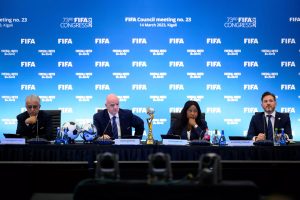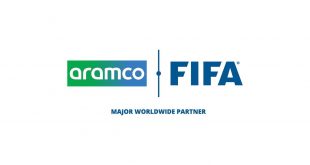 The FIFA Council met in advance of the 73rd FIFA Congress in Kigali, Rwanda, and adopted several key decisions, particularly in relation to the future of men’s and women’s competitions, for which the respective international match calendars were unanimously approved following a detailed consultation process.
The FIFA Council met in advance of the 73rd FIFA Congress in Kigali, Rwanda, and adopted several key decisions, particularly in relation to the future of men’s and women’s competitions, for which the respective international match calendars were unanimously approved following a detailed consultation process.
Men’s International Match Calendar 2025-2030
The Men’s International Match Calendar 2025-2030 will be structured as follows:
- March: a nine-day, two-match window
- June: a nine-day, two-match window (including friendlies in preparation of final tournaments where appropriate)
- Late September/early October: a 16-day, four-match window (to be introduced as of 2026, with two nine-day, two-match windows to be retained in September and October 2025)
- November: a nine-day, two-match window
Based on the new calendar, the 2026 FIFA World Cup final will be played on Sunday, July 19, 2026, with the mandatory release period starting on May 25, 2026, following the last official club match on May 24, 2026 (exemptions may apply to the final matches of confederation club competitions until, May 30, 2026 subject to FIFA’s approval). With 56 days, the total combined number of rest, release and tournament days remain identical to the 2010, 2014 and 2018 FIFA World Cup editions. The detailed Men’s International Match Calendar 2025-2030 will be published in the coming days.
Women’s International Match Calendar 2024-2025
As per the current calendar, the Women’s International Match Calendar 2024-2025 will contain six international windows per year. Some of these windows will include a variety of window types to enable the confederations to deliver their specific competition qualification pathways and to enable the member associations to play friendly matches.
The Women’s Olympic Football Tournament dates (July 25-August 10, 2024) have been added to the calendar, as well as the Concacaf W Gold Cup that will be played for the first time from February 20 to March 10, 2024.
The FIFA Council also unanimously approved the establishment of a dedicated task force on player welfare to ensure the smooth implementation of player welfare principles such as mandatory rest periods.
“FIFA promoted a truly global approach to the discussions on the International Match Calendar, which considered the perspectives of all key stakeholders,” said FIFA President Gianni Infantino. “Our fundamental objective is to have clarity on this topic, and to have meaningful football matches while protecting the well-being of the players and recognising that many regions need more competitive football.”
2026 FIFA World Cup competition format
Based on a thorough review that considered sporting integrity, player welfare, team travel, commercial and sporting attractiveness, as well as team and fan experience, the FIFA Council unanimously approved the proposed amendment to the 2026 FIFA World Cup competition format from 16 groups of three to 12 groups of four with the top two and eight best third-placed teams progressing to a round of 32. The revised format mitigates the risk of collusion and ensures that all the teams play a minimum of three matches, while providing balanced rest time between competing teams.
2025 FIFA Club World Cup – key principles of access list
Following on from the approval of the slot allocation for the 32-team FIFA Club World Cup™ that will be played every four years as of June 2025, the FIFA Council unanimously approved the key principles of access with the aim of ensuring the highest quality possible based on sporting criteria.
With a period of consideration being the four-year period of the seasons ending in 2021 and 2024, the key principles of access are as follows:
- For confederations with more than four slots: access for the champions of the previous four editions of the confederation’s premier club competition, and additional teams to be determined by a club ranking based on the same four-year period
- For confederations with four slots: access for the champions of the previous four editions of the confederation’s premier club competition
- For confederations with one slot: access for the highest ranked club between the champions of the confederation’s premier club competition in the four-year period
- For the host country: access for the club occupying this slot will be determined at a later stage
Other criteria also apply:
- In the event of a club winning two or more editions of the confederation’s premier club competition during the 2021-2024 period, a club ranking calculated based on sporting criteria will be used to grant access
- A cap of two clubs per country will be applied to the access list with an exception in case more than two clubs from the same country win the confederation’s premier club competition over the four-year period
- Further consultation will follow with confederations and stakeholders to define the calculation mechanisms of the club ranking, which will be based on sporting criteria
Yearly FIFA club competition
Since the current version of the FIFA Club World Cup™ will be discontinued after the 2023 edition and, given the need expressed by the confederations for the champions of their premier club competitions to play each other annually to stimulate competitiveness, the FIFA Council unanimously approved the strategic concept of a yearly FIFA club competition as of 2024. This competition will feature the champions of the premier club competitions of all confederations and conclude with a final to be played at a neutral venue, between the winner of the UEFA Champions League and the winner of intercontinental play-offs between the other confederations. Details on timing and format will follow in due course.
2027 FIFA Women’s World Cup Bidding Regulations approved
In line with the decision taken at its meeting on February 14, 2023, the FIFA Council unanimously approved the 2027 FIFA Women’s World Cup Bidding Regulations, which will see the most comprehensive bidding process in the history of the competition before the host(s) are due to be appointed by the FIFA Congress next year.
FIFA Statutes
The FIFA Council also decided to set up a working group across all confederations to conduct a comprehensive review of the FIFA Statutes in order to present proposals to next year’s FIFA Congress. This review shall consider the possibility to extend FIFA’s mandate to include an eFootball category as part of FIFA’s overall objectives.
Transfer reform
The FIFA Council unanimously approved amendments to the FIFA Regulations on the Status and Transfer of Players (RSTP) related to registration periods and the need to ensure increased protection for unemployed football players, as part of the third package of the transfer reform process. In addition, the FIFA Council also agreed to mandate the FIFA administration to explore possible further regulatory steps to protect the well-being of female players in line with the RSTP, particularly in the following areas: adoption, abortion, menstrual health, multiple births, breastfeeding, and childcare.
Other decisions
The regulations in relation to the operations of the FIFA Talent Development Scheme in which FIFA will invest USD 200 million from 2023 to 2026 were unanimously approved. An update on the FIFA Women’s World Cup Australia & New Zealand 2023™ was provided, and the FIFA Council approved the publication of the FIFA World Cup Qatar 2022™ debrief report. The FIFA Council confirmed that the 2023 FIFA Beach Soccer World Cup – UAE will take place from November 16 to 26, 2023, and the slot allocation for the 2025 FIFA Beach Soccer World Cup – Seychelles was also approved (AFC: 3; CAF: 2; CONCACAF: 2; CONMEBOL: 3; OFC: 1; UEFA: 4; host country: 1).
 Arunava about Football A look at football & the world through my eyes!
Arunava about Football A look at football & the world through my eyes!



